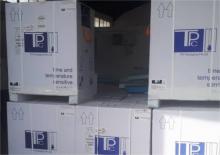Public health experts elated with COVID-19 vaccine delivery, assure Nigerians of vaccine effectiveness and safety.
Abuja, 8 March, 2021 - When Nigeria, the most populous country in Africa received the first batch of COVID-19 vaccines, government officials and stakeholders heaved a sigh of relieve.
For Dr Osagie Ehanire, Nigeria’s Minister of Health, “It is a feeling of relief and elation that at last we are joining the community of nations who can vaccinate their citizens against COVID-19 disease which has been raging across the world. We have to some extent lagged but are relieved that we can now start vaccinating our citizens.
On 02 March 2021, Nigeria received nearly 4 million doses of the COVID-19 vaccine, shipped via the COVAX Facility, a partnership between CEPI, Gavi, UNICEF and WHO. The consignment for Nigeria made it the third country in West Africa after Ghana and Cote D’Ivoire to receive the vaccines.
Understandably, partners in the forefront of COVID-19 response echoed the Minister’s excitement.
To Dr Walter Kazadi Mulombo, the WHO Nigeria Country Representative (WR), “This is a real milestone for Nigeria and as a member of WHO, I really feel proud to have been part of the COVAX facility alongside GAV, CEPI and UNICEF. We are proud that we are able to ship this first consignment to Nigeria which will start the campaign that will hopefully end the pandemic not only in Nigeria but even outside Nigeria. I really feel proud to have been part of history in the making.”
COVAX is co-led by Gavi, the Vaccine Alliance, the World Health Organization (WHO) and the Coalition for Epidemic Preparedness Innovations (CEPI), working in partnership with UNICEF, the World Bank, civil society organisations, manufacturers, and others. COVAX is part of the Access to COVID-19 Tools (ACT) Accelerator, a ground-breaking global collaboration to accelerate development, production, and equitable access to COVID-19 tests, treatments, and vaccines.
It could be recalled that when the first case was reported on 27th February, 2020, the Nigeria Centre for Disease Control (NCDC), with support from partners, such as the World Health Organization, mounted a robust response plan to contain its spread; one of the highly acclaimed responses by developing economies.
Therefore, while waiting to receive the vaccines at Nnamdi Azikiwe Airport, a highly expectant Dr Chikwe Ihekweazu, Director General of NCDC said, “Today we will start a journey in Nigeria that will hopefully take us back to some normalcy of living the way we love to live in Nigeria, full of life, able to shake hands, able to take off face mask and able to celebrate with each other, but for now ,all recommended non pharmacological interventions(NPIs) must continue. Today is a very important day for our country.
Equitable distribution plan
Nigeria will not recover from COVID-19 pandemic if there is inequity in the distribution of the vaccines across all the States. To address this concern, the Minister of Health said that there ” is a very intricate distribution plan that has been set up by the federal ministry of health and organized by the National Primary Health Care Development Agency; the agency responsible for immunizations which also have a lot of experience from the polio eradication initiative for addressing all the logistics and difficulties required to ensure delivery of vaccines to every eligible person.
I am satisfied that the National vaccine deployment plan (NDVP) will be properly executed and the advisory of starting with frontline health workers, the elderly and the vulnerable population will be adhered to”.
Speaking further, Dr Faisal Shuaib, the Executive Director of NPHCDA said, “This is a key part of our commitment to the Nigerian people to ensure full transparency, as we distribute and introduce safe and effective COVID-19 vaccines.”.
Assurance on vaccine effectiveness and Safety.The excitement following delivery of vaccine notwithstanding, conspiracy theories have emerged to discredit the vaccine’s safety and efficacy. Consequently, the DG of NCDC noted that, “Whenever there is something new, there is some level of anxiety, but I am confident about the safety and efficacy of the vaccine. We have been through lots of vaccination campaigns and we always know that we have to engage with the community, explain to them, demonstrate to them the value that the vaccines have brought.” WHO has reviewed the available science behind the different vaccine candidates and have issued emergency used listing (EUL) to all vaccines being deployed through the Covax Facility. In Nigeria, NAFDAC, the regulatory agency has also given approvals for the use of these vaccines.
To further encourage Nigerians, he said “I have always said that there is no greater intervention in medicine than vaccines. Our role is to continue educating and working with ourselves. We understand where these anxieties are coming from but we will also demonstrate as always and come together as a country, engage with people and demonstrate the values this vaccine will bring and make sure that we see the numbers come down, which is exactly what will happen when we introduce the vaccine.”
A word of caution
Being vaccinated doesn't mean that we can throw caution to the wind and put ourselves and others at risk. To buttress this point, the Dr Mulombo said “vaccine is a powerful tool but it is an additional tool. Nigerians need to continue adhering to other public health and social measures. People need to continue to wear face masks in public, avoid confined places, continue to wash their hands or use hand sanitizers, maintain physical distancing and other measure.
WHO will continue to support the Government of Nigeria to supporting the implementation of national response plan for rapid case detection, isolation and treatment to interrupt transmission and control the pandemic
Technical Contacts
JEAN BAPTISTE, Anne Eudes. Email: jeana [at] who.int; Tel: +234 813 173 6281




